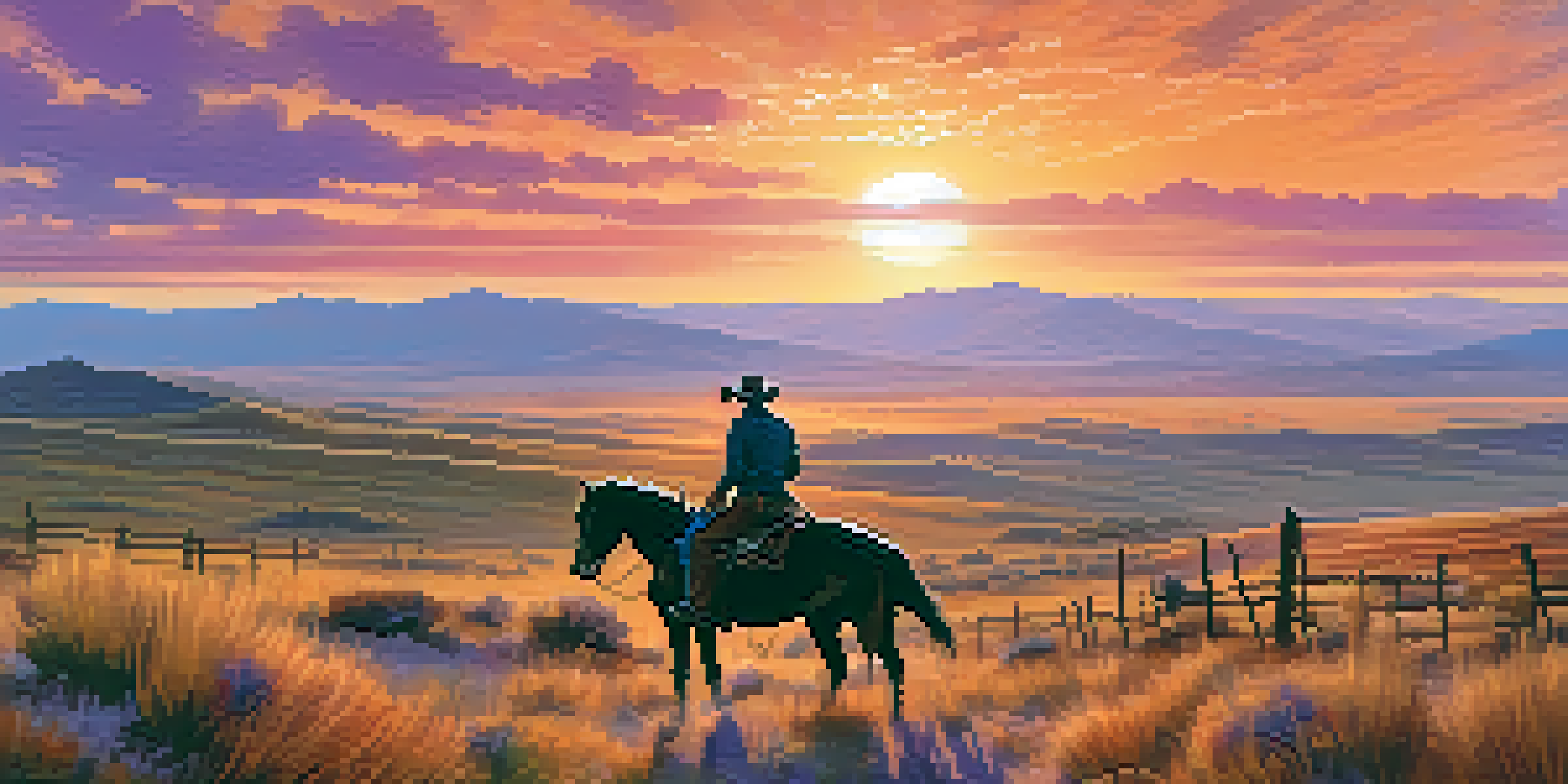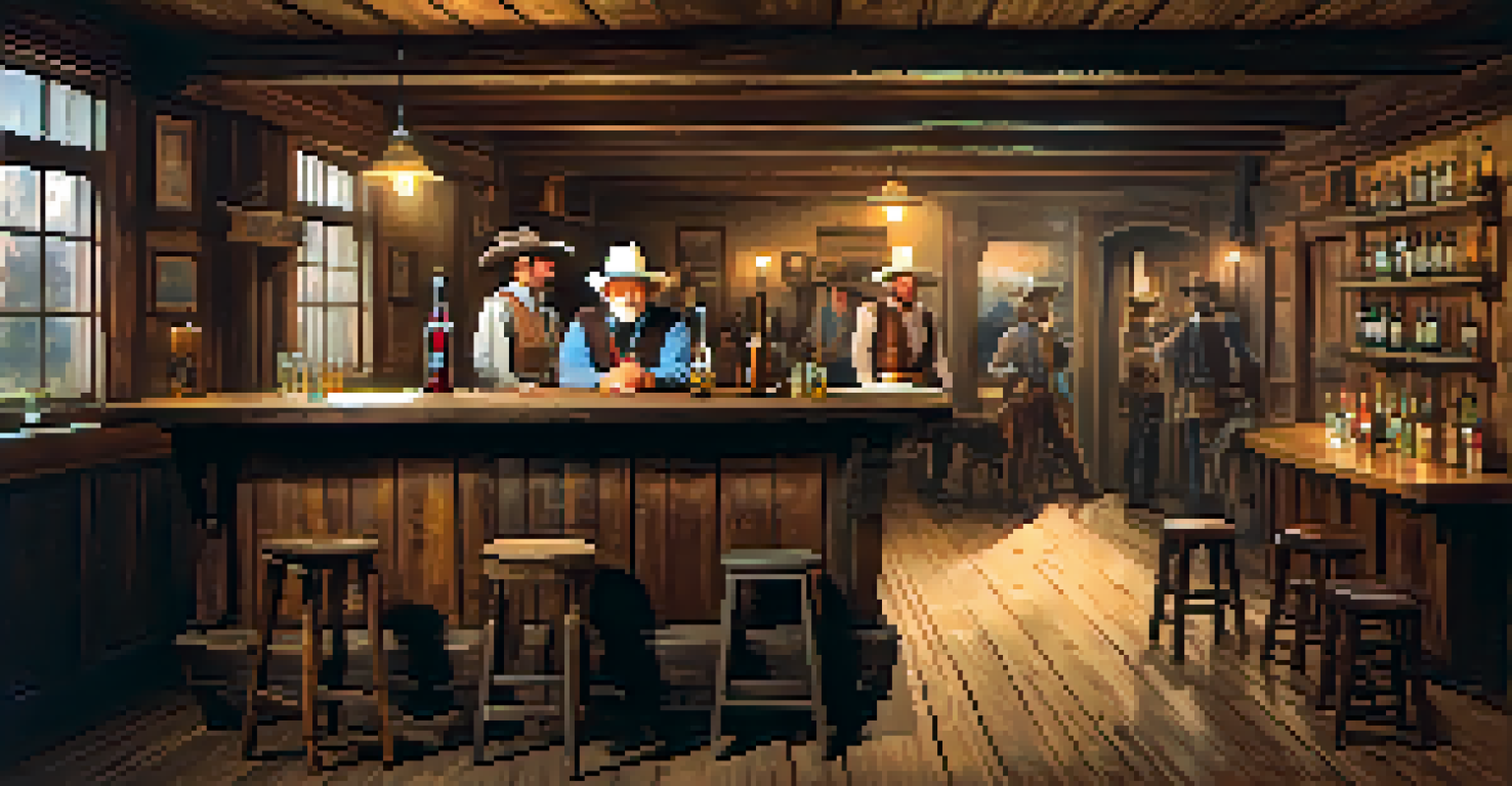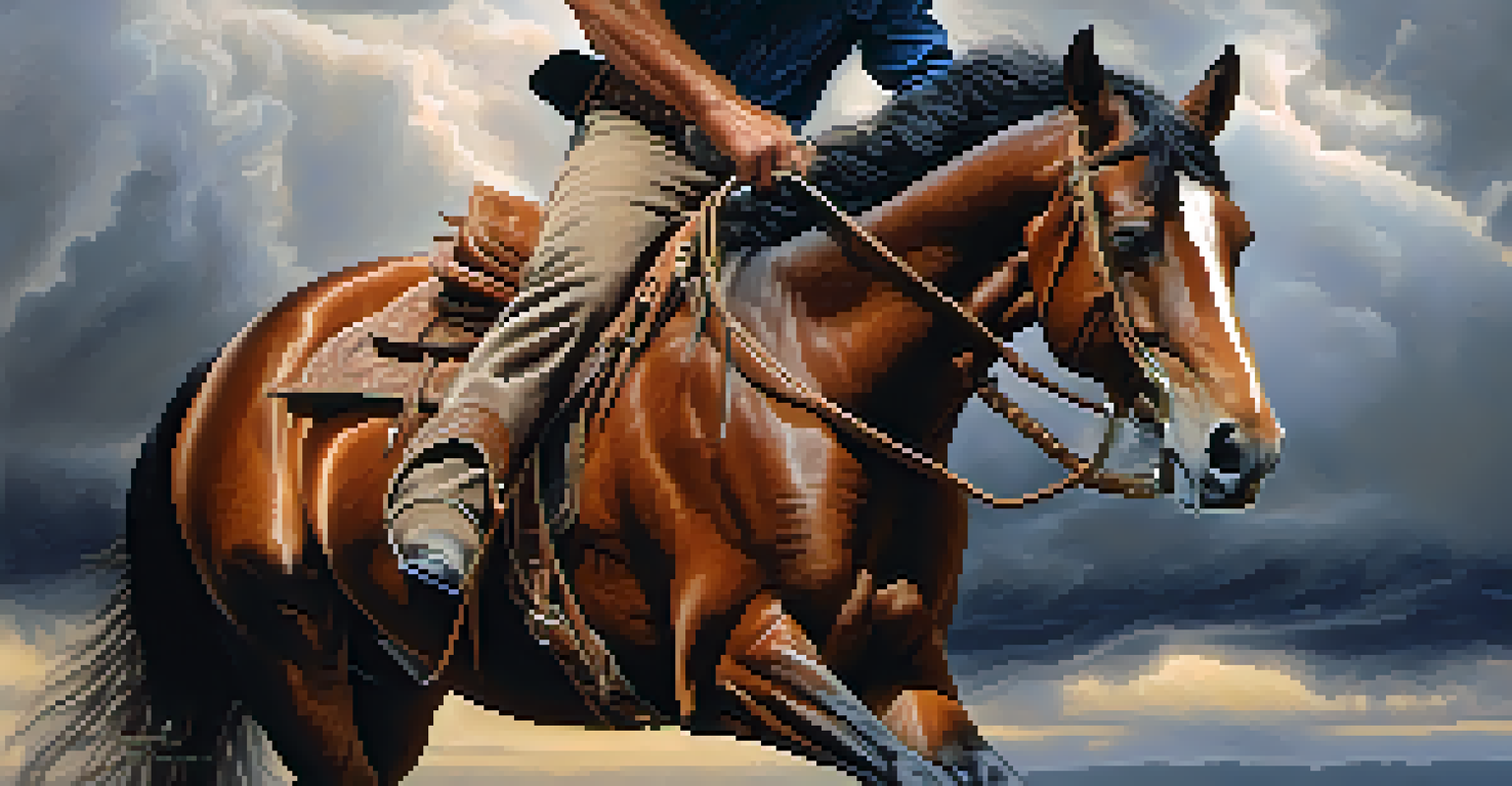The Western Genre: Nostalgia and Its Psychological Impact

The Allure of the Western: A Brief Overview
The Western genre, often set against vast, rugged landscapes, captures a unique slice of American history. With themes of adventure, individualism, and moral complexity, it has enchanted audiences for generations. Movies and novels in this genre evoke a sense of freedom and rugged masculinity, making them timeless classics.
Nostalgia is a file that removes the rough edges from the good old days.
From John Wayne to Clint Eastwood, the iconic heroes in Westerns embody the struggle between civilization and the untamed frontier. These characters often face moral dilemmas, reflecting the conflicts of their time while appealing to our innate desire for justice. The Western genre invites viewers to ponder the complexities of right and wrong in a lawless land.
As we delve deeper into the genre, we find that its appeal goes beyond mere entertainment. It taps into nostalgia, evoking feelings of longing for a simpler, albeit romanticized, past. This longing can have profound psychological effects, shaping our identities and influencing our cultural narratives.
Nostalgia: A Powerful Psychological Force
Nostalgia is often described as a bittersweet emotion, blending happiness for cherished memories with sadness for their passing. It serves as a coping mechanism, allowing individuals to reconnect with their past and find comfort in familiar experiences. This emotional response can be particularly strong in relation to the Western genre, which often showcases a bygone era of American life.

The psychological impact of nostalgia can lead to increased feelings of social connectedness and emotional resilience. When we immerse ourselves in Western films or literature, we often recall our own stories or those of our families, creating a sense of belonging. This collective memory can strengthen our ties to cultural traditions, reinforcing our identities.
Nostalgia Shapes Western Identity
The Western genre allows audiences to explore and connect with their identities through nostalgic themes and characters.
Moreover, nostalgia can also influence our perceptions of contemporary issues. The idealized world of the Western often contrasts sharply with modern challenges, prompting viewers to reflect on societal changes. This reflection can stir discussions about values, ethics, and the direction in which society is heading.
Cultural Reflection: The Western as a Mirror
The Western genre serves not only as a source of entertainment but also as a mirror reflecting societal values and beliefs. During its heyday, it highlighted themes such as masculinity, heroism, and the American Dream. However, as societal norms have evolved, so too has the portrayal of these themes within Western narratives.
The past is never dead. It's not even past.
In recent years, modern Westerns have begun to challenge traditional stereotypes, incorporating diverse perspectives and addressing issues like race, gender, and class. This evolution illustrates how nostalgia can be reinterpreted, allowing new generations to connect with the genre while fostering critical conversations about its history.
For example, films like 'The Harder They Fall' and 'Django Unchained' reimagine the Western landscape, providing fresh narratives that honor the past while pushing for progress. By examining these adaptations, we can appreciate how nostalgia shapes our understanding of culture and influences artistic expression.
The Role of Music in Evoking Nostalgia
Music plays a crucial role in establishing the emotional landscape of Westerns, amplifying the sense of nostalgia. Iconic scores, like those composed by Ennio Morricone, create a sonic backdrop that enhances the viewing experience. These soundtracks often evoke feelings of longing, transporting audiences to a time and place filled with adventure and romance.
The melodies associated with Westerns frequently draw on traditional folk music, further anchoring the genre in cultural history. This connection to familiar sounds can trigger personal memories or cultural associations, deepening the nostalgic experience. As viewers listen to these scores, they may find themselves reminiscing about their own lives, making the stories resonate on a personal level.
Western Films Reflect Societal Values
Modern Westerns challenge traditional stereotypes, reflecting evolving societal norms and sparking critical conversations.
Moreover, the integration of music in Westerns can influence how we perceive characters and their journeys. A haunting melody may accompany a hero's solitude, while a rousing tune underscores a triumphant moment. This interplay between sound and narrative fosters an emotional bond that enhances our connection to the genre.
Western Aesthetics: Crafting a Nostalgic Visual Experience
The visual elements of Westerns contribute significantly to their nostalgic appeal. From sweeping landscapes to dusty saloons, these settings evoke a romanticized vision of the American frontier. Cinematography plays a vital role in capturing the essence of this world, often emphasizing the stark contrasts between light and shadow.
Costume design also enhances the nostalgic atmosphere, with iconic hats, boots, and leather jackets becoming symbols of the genre. These visual cues not only define characters but also transport viewers to a different time and place, allowing them to immerse themselves fully in the narrative. The aesthetics of Westerns create a compelling backdrop that complements the emotional weight of the stories being told.
As filmmakers continue to experiment with visual storytelling, they often draw inspiration from the classic Westerns of the past. This ongoing dialogue between old and new highlights the enduring impact of the genre while keeping the nostalgic flame alive. Through careful attention to visual detail, Westerns remain a powerful vehicle for nostalgia.
Nostalgia and Identity in the Western Genre
The Western genre allows individuals to explore and express their identities through the lens of nostalgia. As audiences engage with these stories, they may find themselves identifying with characters or situations that resonate with their own experiences. This connection fosters a sense of belonging and validation, as viewers see their struggles or triumphs reflected on screen.
Furthermore, the Western genre often grapples with themes of heroism and morality, prompting audiences to consider their own values and beliefs. As viewers navigate the complexities of these narratives, they may confront their personal histories and the cultural narratives that shape them. This introspection can lead to meaningful conversations about identity and purpose.
Music Enhances Nostalgic Experience
Iconic scores in Westerns evoke feelings of nostalgia, deepening the emotional connection viewers feel with the narratives.
In a society that continually evolves, the Western genre remains a space for reflection and exploration. By examining the nostalgic elements within these stories, we gain insight into how our past informs our present identities. This interplay between nostalgia and identity showcases the enduring relevance of the Western genre.
Conclusion: The Lasting Legacy of Nostalgia in the Western Genre
The Western genre, with its rich tapestry of nostalgia, continues to captivate audiences by weaving together themes of adventure, morality, and identity. As we explore its psychological impact, we uncover how nostalgia shapes our understanding of the past and informs our present. This genre not only entertains but also encourages reflection on our values and cultural narratives.
The evolution of Westerns showcases the genre's adaptability, allowing it to remain relevant in contemporary discussions. As filmmakers and writers reinterpret classic themes, they invite new audiences to engage with the past while considering modern complexities. This ongoing dialogue ensures that the Western genre remains a vital part of our cultural landscape.

In conclusion, the intersection of nostalgia and the Western genre offers a unique lens through which we can examine our identities and societal values. As we continue to journey through these stories, we embrace the nostalgia that connects us to our shared history, reminding us of the enduring power of storytelling.